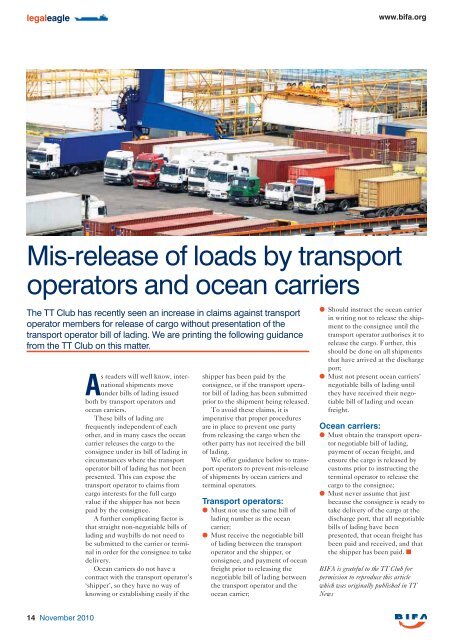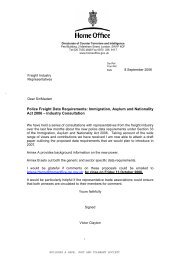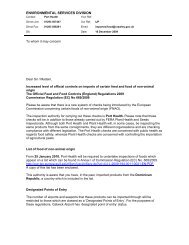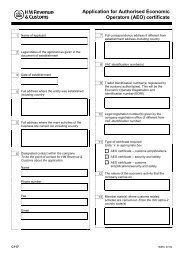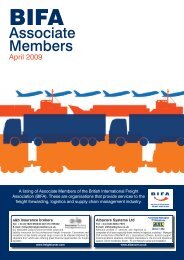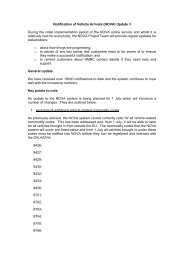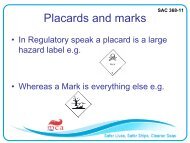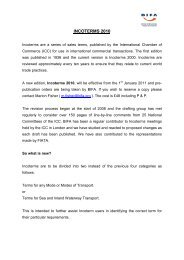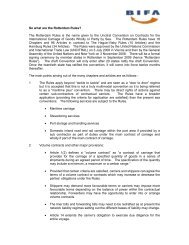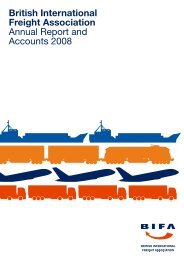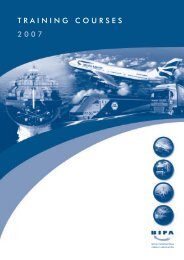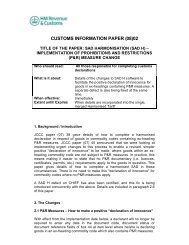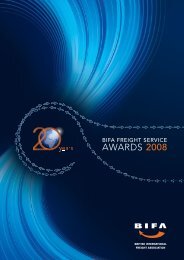BIFAlink cover - British International Freight Association
BIFAlink cover - British International Freight Association
BIFAlink cover - British International Freight Association
- No tags were found...
You also want an ePaper? Increase the reach of your titles
YUMPU automatically turns print PDFs into web optimized ePapers that Google loves.
legaleagle<br />
www.bifa.org<br />
Mis-release of loads by transport<br />
operators and ocean carriers<br />
The TT Club has recently seen an increase in claims against transport<br />
operator members for release of cargo without presentation of the<br />
transport operator bill of lading. We are printing the following guidance<br />
from the TT Club on this matter.<br />
As readers will well know, international<br />
shipments move<br />
under bills of lading issued<br />
both by transport operators and<br />
ocean carriers.<br />
These bills of lading are<br />
frequently independent of each<br />
other, and in many cases the ocean<br />
carrier releases the cargo to the<br />
consignee under its bill of lading in<br />
circumstances where the transport<br />
operator bill of lading has not been<br />
presented. This can expose the<br />
transport operator to claims from<br />
cargo interests for the full cargo<br />
value if the shipper has not been<br />
paid by the consignee.<br />
A further complicating factor is<br />
that straight non-negotiable bills of<br />
lading and waybills do not need to<br />
be submitted to the carrier or terminal<br />
in order for the consignee to take<br />
delivery.<br />
Ocean carriers do not have a<br />
contract with the transport operator’s<br />
‘shipper’, so they have no way of<br />
knowing or establishing easily if the<br />
shipper has been paid by the<br />
consignee, or if the transport operator<br />
bill of lading has been submitted<br />
prior to the shipment being released.<br />
To avoid these claims, it is<br />
imperative that proper procedures<br />
are in place to prevent one party<br />
from releasing the cargo when the<br />
other party has not received the bill<br />
of lading.<br />
We offer guidance below to transport<br />
operators to prevent mis-release<br />
of shipments by ocean carriers and<br />
terminal operators.<br />
Transport operators:<br />
● Must not use the same bill of<br />
lading number as the ocean<br />
carrier;<br />
● Must receive the negotiable bill<br />
of lading between the transport<br />
operator and the shipper, or<br />
consignee, and payment of ocean<br />
freight prior to releasing the<br />
negotiable bill of lading between<br />
the transport operator and the<br />
ocean carrier;<br />
● Should instruct the ocean carrier<br />
in writing not to release the shipment<br />
to the consignee until the<br />
transport operator authorises it to<br />
release the cargo. Further, this<br />
should be done on all shipments<br />
that have arrived at the discharge<br />
port;<br />
● Must not present ocean carriers’<br />
negotiable bills of lading until<br />
they have received their negotiable<br />
bill of lading and ocean<br />
freight.<br />
Ocean carriers:<br />
● Must obtain the transport operator<br />
negotiable bill of lading,<br />
payment of ocean freight, and<br />
ensure the cargo is released by<br />
customs prior to instructing the<br />
terminal operator to release the<br />
cargo to the consignee;<br />
● Must never assume that just<br />
because the consignee is ready to<br />
take delivery of the cargo at the<br />
discharge port, that all negotiable<br />
bills of lading have been<br />
presented, that ocean freight has<br />
been paid and received, and that<br />
the shipper has been paid. ■<br />
BIFA is grateful to the TT Club for<br />
permission to reproduce this article<br />
which was originally published in TT<br />
News<br />
14 November 2010


